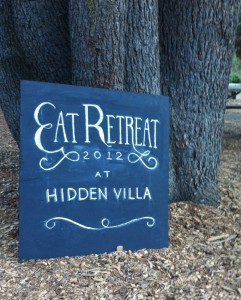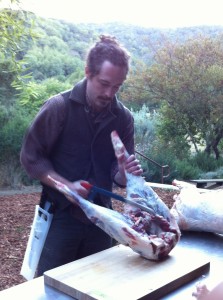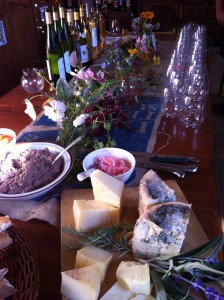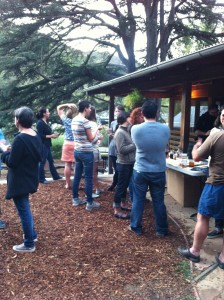(banner photo © Jesse Friedman)
The first time back in my Chicago kitchen after returning from Eat Retreat, I brewed a cup of coffee the way Stephen taught us.  I applied the lessons of Heather’s slaughter workshop and made 8 quarts of stock using a recipe from Kimberley. I ate bread smothered with olive oil from Sara and Dafna’s Hungarian Pepper jam as it simmered. The finished stock went into Molly’s recipe for Braised Cranberry Beans and a failed attempt to recreate Mirit’s shakshuka. Every decision I’ve made about food in the last few weeks has been influenced by the knowledge we shared that weekend of October 26, and the delicious result of those decisions reconnect me with the new family we formed.
I applied the lessons of Heather’s slaughter workshop and made 8 quarts of stock using a recipe from Kimberley. I ate bread smothered with olive oil from Sara and Dafna’s Hungarian Pepper jam as it simmered. The finished stock went into Molly’s recipe for Braised Cranberry Beans and a failed attempt to recreate Mirit’s shakshuka. Every decision I’ve made about food in the last few weeks has been influenced by the knowledge we shared that weekend of October 26, and the delicious result of those decisions reconnect me with the new family we formed.
Another Kind of ER
Eat Retreat is a 3-day, attendee-led workshop for people who love food and have a lot to say about it. It brings together all sorts from the culinary world — from butchers to brewers, nutritionists to technologists … every piece of life in the kitchen is represented.
Created in 2011 by Laura Brunow Miner, Kathryn Tomajan and Emily Morgan, Eat Retreat is a grassroots salon, comprised of folks with varied backgrounds who do interesting things in the food community. Each attendee must apply online and is hand selected by Miner, Tomajan and Morgan. This was their second retreat.
A farm in a forest in what looked like mountains outside of San Francisco, where Cesar Chavez organized his first farm-worker’s strike, was our home for the weekend.
In my preparations for the trip, I didn’t know quite what to expect. I knew I was going to meet new people, eat and drink very well, and learn new things. I knew that I was probably going to get a sunburn, and I heard that there would be salt tastings and butchery demonstrations. But I wasn’t expecting to walk away with a new perspective on what we eat, what we call family, and how those two interact.
We convened at the retreat site in the early evening on Friday. A farm in a forest in what looked like mountains outside of San Francisco, where Cesar Chavez organized his first farm-worker’s strike, was our home for the weekend. We were welcomed with a spread of oysters and mason jars with our names written on them that served as our coffee mugs, wine glasses, and name tags for all three days. Amid cheerful introductions and the sounds of mason jars filling with beer, I had my first oyster with the coaching of my new friends. It was met with a “cheers” and followed with a round of applause. My experience with the bivalves was a shared experience, and my first briny, fresh oyster quickly became my second and third.
Getting Down to Business
The first official activity was the butchery of a whole lamb. In a few hours those cuts would become grilled leg of lamb with black truffle and fig, a Sichuan peppercorn stir fry that left our mouths tingly and eager for more, and a gorgeous paté that would surface during the next day’s wine tasting. We ate all of our meals family style, and piled into summer camp style bunk beds. With no privacy and no want for it, we skipped the small talk and stayed up late playing card games, drinking Malört, eating bread covered in butter and jam. We talked until 4 a.m. about our favorite foods and the family we left at home to fend for themselves in the kitchen for the weekend.
We woke up the next day with just enough hangover to help us remember the night before and filled our mason jars with coffee that tasted like milk chocolate and blueberries. About half of us headed to the chicken shack on the far edge of the farm to slaughter our dinner.
Heather, the brassy brunette who had just walked away from the NYC graphic design firm owned with her husband in exchange for an internship on a Pennsylvanian farm, was our guide through dispatching and disemboweling our supper. The mood was quietly nervous. It felt like going to church but with more caffeine. Heather spoke of intentions, of determination, and how hesitation would only make the process more difficult for everyone involved, that the chicken deserved more respect than squeamishness and regret. Watching her separate three chickens from their heads was like watching someone dance. In those moments of death and artistry, we all came to a new appreciation of what it meant to eat meat, and gained a new respect for our fellow Eat Retreaters for handling our dinner with care.
The Takeaway
The walk back to the main house was long and contemplative, but the rest of our friends welcomed us with coffee refills and still-warm sweet potato biscuits. We fell back into conversations, sharing our humbling experience, and filled the rest of the day with white wine tastings, olive oil workshops, and the best smoked salmon possibly on the planet. We ate that morning’s chicken with our fingers and drank from good wine the bottle, and it felt like coming home.
That sense of homecoming is what I walked away from Eat Retreat holding most dear. Every time I make coffee, or eat a piece of chicken, I remember the people I met and the adventure we took together in the name of a few good meals.
More about Eat Retreat
The group spends the weekend cooking together, experimenting with ingredients and techniques, and sharing their expertise — formally through workshops and informally around the campfire. It’s a hands-on, experiential format designed to inspire, rejuvenate and celebrate a love for food.
Most important are the relationships that emerge from weekend. People leave with a strong network of friends, supporters, and collaborators for future projects.
Comments Mike Lee of StudioFeast, “the chances to bond and get into trouble with my fellow Eat Retreaters was what I’ll remember most. Like summer camp, the true value isn’t so much learning how to make a canoe, it’s creating a lifelong memory with the people that were in your canoe when it flipped over in the lake.”
The date for 2013 is not yet set but visit Eat Retreat and sign up for email notification if you are interested in being considered.



Eat Retreat: Overnight Camp for Food Lovers: (banner photo © Jesse Friedman) The first time back i… http://t.co/TZvzcbRW via @toquemag